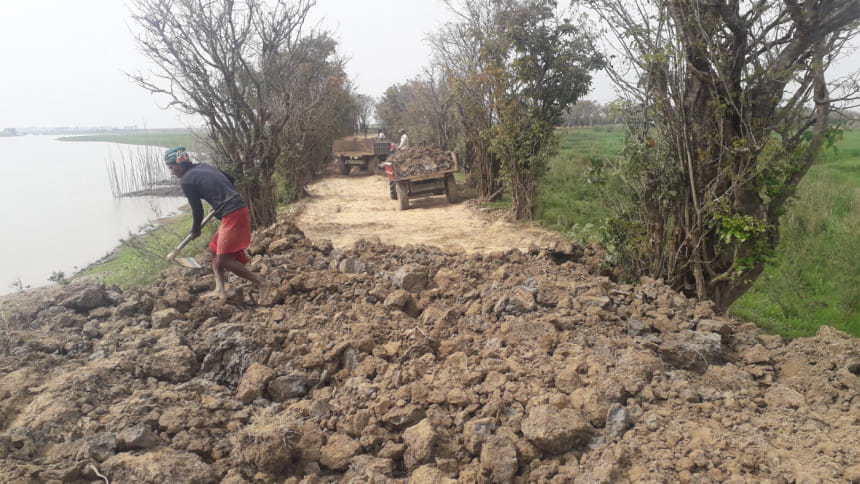Delay in dyke construction threatens Boro harvest

Farmers in the haor (wetland) areas under Sunamganj district have alleged that the government has failed to complete the construction and repair works of dykes for protecting croplands on time.
As a result, flash floods may cause significant damage to their Boro harvest again.
According to the officials of Bangladesh Water Development Board (BWDB), 90 percent construction and repair works of crop protection dykes were completed by the February 28 deadline and 98 percent by the extended deadline on March 7.
However, farmers and rights activists observed that only around 60 percent works have been completed by March 7, bringing allegations of negligence and low-quality work.
They also said that the government had also failed to complete the works even after extended time in the previous two years.
According to the BWDB, 591 kilometres of dykes at 38 haors in Sunamganj are being constructed and repaired under 735 projects, with an estimated budget of Tk 125 crore.
According to the Department of Agricultural Extension in Sunamganj, Boro paddy is estimated to be cultivated on 223,245 hectares of land in the district this year -- including 165,350 hectares in low-lying haor areas.
Located at the foothill of India's Meghalaya state, Sunamganj has a unique ecosystem due to the haors, which allow irrigation water for Boro paddy cultivation during the dry season, before being harvested within April-May.
However, excessive rainfall in Meghalaya often triggers flash floods during the harvest season, damaging the crops.
To address this, the government started constructing dykes to protect the Boro crops.
After the flash floods of 2017 that revealed the anomalies and corruption in dyke construction, the government revised the "Kajer Binimoye Taka (Kabita)" rules, dictating formation of project implementation committees by November 30 every year to build or repair the dykes.
The new rules also stipulate that the work must be started before December 15, and completed by February 28.
Talking to this correspondent, at least 10 farmers from Dharmapasha, Madhyanagar, Jamalganj and Jagannathpur upazilas of the district said most of the dykes were not constructed or repaired timely this year.
"It has become a common practice that they would fail to complete the work on time and get easy extension. No matter what happens, no one has ever been held accountable for such negligence," said farmer Jyotimohon Das from Jamalganj upazila.
Since December 15 last year, many allegations of anomalies in forming project committees, intentionally delaying works, and using substandard materials have surfaced.
"On field observation by our members at every ward suggest that only around 60 percent of works have been completed within the extended deadline. Given that the budget this year was the highest compared to previous years, the works are marred with anomalies and irregularities," said Bijon Sen Roy, general secretary of Haor Bachao Andolon's central unit.
"Visiting the dykes, we have found that the compaction is not correct, the grass is not planted, important closures are vulnerable and many other anomalies. We will take legal action against those responsible," said Bijon, also a member of the district committee for construction and repair of the dykes.
However, Mamun Howlader, executive engineer of BWDB in Sunamganj and member secretary of the district committee, refuted the allegations.
"Around 98 percent works has been completed while the finishing touches like grass plantation, correcting compaction and strengthening important parts are on progress," he added.
He also termed the allegations of irregularities baseless.

 For all latest news, follow The Daily Star's Google News channel.
For all latest news, follow The Daily Star's Google News channel. 



Comments